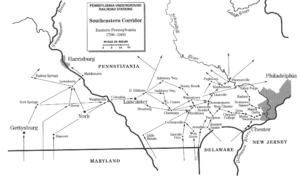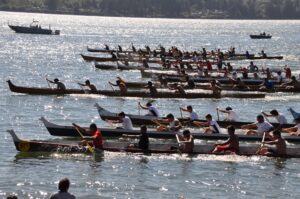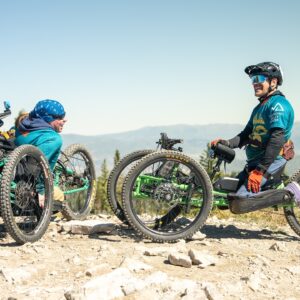States, territories and tribal governments are innovating to make travel, tourism and outdoor recreation more accessible and equitable. With increasing awareness of the well-documented health and wellness benefits of travel and outdoor activity, all people deserve the opportunity to enjoy the nation’s countless tourism destinations.
Demand is growing, and Governors are taking action – championing policies to ensure their unique parks, museums, attractions and historic sites are accessible and welcoming for all. It’s a win-win – delivering financial benefits to multiple sectors of the economy and providing health benefits to travelers.
The NGA Outdoor Recreation Learning Network and Economic Policy teams are working with state, local, territory, and tribal recreation and economic development networks and the Oregon State University’s Center for the Outdoor Recreation Economy (CORE) to study the effectiveness of U.S. Economic Development Administration Travel, Tourism and Outdoor Recreation (TTOR) grants.
In a series of NGA webinars, state and other officials are sharing best practices and highlighting innovative and replicable projects. Following webinars on economic resiliency and workforce development, NGA recently held a third webinar focused on Advancing Equity in the Travel, Tourism, and Outdoor Recreation Sectors.
Speakers included:
- Carrie Lepore, Deputy Secretary of Tourism, Pennsylvania Department of Community & Economic Development, Commonwealth of Pennsylvania
- Michael Chapaloney, Executive Director of Tourism, Pennsylvania Department of Community & Economic Development, Commonwealth of Pennsylvania
- Sean Lawrence, Director, Office of Economic Policy, Lummi Nation
- Katie Cook, Grants and Development Manager, National Ability Center
Pennsylvania is advancing equity in the TTOR sectors through a number of projects, including the African American heritage story project, diversified marketing and messaging, and diversity, equity and inclusion (DEI) training programs for industry stakeholders in the state.
Chapaloney noted the state experienced “explosive outdoor recreation growth” during the pandemic, explaining that the Department of Community & Economic Development is focused on using grant funding to fuel the state’s economy through travel and tourism, addressing two primary travel industry needs: immediate industry recovery and long-term resilience.
Pennsylvania is committing its grant funding to three projects: advertising and marketing to draw visitors; incorporating diversity, equity and inclusion (DEI) in marketing, messaging and project development; and implementing an Outdoor Ambassador program to meet growing demand.
Lepore expanded on Pennsylvania’s DEI initiatives, explaining, “Increasing the volume of Black and other nonwhite travelers as well as those with various ability levels and sexual orientations to Pennsylvania will have a significant positive impact on the economy. And, of course, it’s just the right thing to do.”
Elaborating on the economic benefits, Lepore detailed the “halo effects” of increased tourism, which include business development, talent attraction, real estate sales, purchase of second homes, and college recruitment.
Pennsylvania’s Department of Community & Economic Development is partnering with nonprofit Voices Underground and Lincoln University, one of the nation’s first Historically Black Colleges and Universities (HBCUs), to identify and map existing assets, as well as develop new products to help build the commonwealth’s catalogue of experiences surrounding Black history and culture. The Department plans to highlight rich cultural and historic heritage, including sites associated with the Underground Railroad and historic figures including playwright August Wilson and civil rights activist Bayard Rustin.
In addition to the focus on sites, Pennsylvania will host DEI training for tourism industry workers, including frontline workers to ensure travelers of all backgrounds “feel seen, respected and safe.” The program also provides accreditation to participants, which has value for their careers.
The Lummi Nation, a tribe located in Northwest Washington State, highlighted their project focused on constructing a marketplace to support tribal artisans and other businesses. Lawerence noted that the Lummi Nation is comprised of 5,400 members and includes 183 registered Tribal businesses. The Tribe received a competitively awarded grant from EDA’s TTOR program that provides funding to build a central marketplace for Lummi artisans and other businesses. The project lead for this EDA grant is the Lummi Indian Business Council comprised of elected officials that serve the community. The mission statement of the Lummi Council is to “preserve our way of life.” The Business Council created a Comprehensive Economic Development Strategy (CEDS) that is updated annually, and a brick-and-mortar marketplace location for tribal businesses was identified as a key community need. A central marketplace will help meet the Business Council’s goal of increasing the number and economic vitality of Lummi owned businesses.
The central marketplace will serve as a location for Tribal artisans and craft makers to sell their wares to the larger community. The Lummi Vendor Marketplace will be a 9,000 sq. foot multi-use facility located on the Lummi Reservation. There will be space for vendors, a community kitchen, office space – all established with the intent to better support small Tribal businesses. This project is currently in the contracting process; the Business Council issued a Request for Proposals (RFP) and is in negotiations for hiring design and engineering teams. Lawrence stated that “we anticipate that in the next two years vendors will have a place to call home.”
The Vendor Marketplace will support a number of large, annual tribal events that provide significant revenue to local businesses. One of the Tribe’s largest annual events is the Lummi Stommish Water Festival that features crafts and wares from Tribal artisans for sale. Members of the Tribes sell their products, as well as food and drinks, to participants, generating a significant tourism base in the region. The Lummi Nation also hosts an annual winter festival at their casino, and in the future hopes to host these and other events at their Vendor Marketplace.
Lastly, the Vendor Marketplace will host the Lummi Chamber of Commerce, which is in the process of being created. This location is anticipated to be a “consistent, reliable meeting location for small businesses to discusses issues they are facing.” Once established, the Chamber of Commerce will partner with the Lummi Community Development Financial Institution (CDFI) to support Tribal businesses. Businesses at the Vendor Marketplace will be able to seek business coaching and financing from the Lummi CDFI, further enhancing economic development in the community.
The final innovative equity project profiled in this webinar was the effort of the National Ability Center (NAC), located in Park City, Utah, to provide recreational resources to individuals of all abilities. Katie Cook, Grants & Development Manager at the Center, provided an overview of the Center’s grant from EDA. NAC received a grant of $371,600 under EDA’s competitive TTOR program about two years ago, utilizing this funding for adaptive equipment and staffing. The National Ability Center provides adaptive recreation programs for people with all abilities, requiring a great deal of equipment and resources. The organization used the EDA award to purchase ski equipment and bikes, as well as trailers, a small bus, and an SUV.
Tracy Meier, Programs & Education Director, presented on the Center’s equity principles. NAC was established in 1985; more than half of its participants come from out of state. Meier pointed out that “disability is naturally a part of the human experience; with one in four persons in this country having a disability, whether visible or invisible.” The organization serves individuals with cancer, PTSD, and other physical and/or mental disabilities. The programs focus on individuals “building confidence to help live their best lives.”
The National Ability Center is headquartered at a 26-acre ranch in Park City with a satellite location in Moab. The organization serves people of all ages and abilities. Around 30 percent of those served by the organization are veterans and others who have served our country. This past year, NAC served more than 5,400 people from all 50 states and 18 countries, with many spending up to a week at the Center’s lodge to experience its outdoor recreation programs.
Adaptive sports equipment is expensive, and the funding provided by EDA through TTOR has enabled NAC to invest in additional equipment and transportation vehicles, such as a specialbike referenced by Meier that costs around $40,000, offering participants access to equipment they might not otherwise be able to access due to affordability or other constraints. NAC has 20 different program offerings including hiking, yoga, skiing, and more. The organization provides mountain biking excursions all over the state, has programming at six rivers (whitewater rafting, etc.) and is continuously helping develop trails that are usable to all.
NGA will continue to highlight innovative Travel, Tourism & Outdoor Recreation (TTOR) projects. NGA expects to host its next webinar on EDA TTOR projects in December 2023, and will release a report summarizing findings from projects with significant economic impacts and inventive practices in the fall of 2024.















